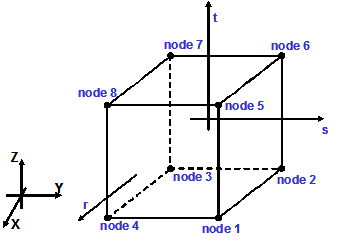Standard Brick Element: Difference between revisions
Jump to navigation
Jump to search
No edit summary |
No edit summary |
||
| Line 33: | Line 33: | ||
#Note: Node numbering for this element is different from that for the eight-node brick (Brick8N) element. | #Note: Node numbering for this element is different from that for the eight-node brick (Brick8N) element. | ||
#The valid queries to a Quad element when creating an ElementRecorder object are 'forces', 'stresses,' and 'material $matNum matArg1 matArg2 ...' Where $matNum refers to the material object at the integration point corresponding to the node numbers in the isoparametric domain. | #The valid queries to a Quad element when creating an ElementRecorder object are 'forces', 'stresses,' and 'material $matNum matArg1 matArg2 ...' Where $matNum refers to the material object at the integration point corresponding to the node numbers in the isoparametric domain. | ||
# There is another brick element that was written using Tensor classes. Info can be found [http://opensees.berkeley.edu/OpenSees/manuals/usermanual/733.htm here]. | |||
Revision as of 00:25, 2 April 2010
- Command_Manual
- Tcl Commands
- Modeling_Commands
- model
- uniaxialMaterial
- ndMaterial
- frictionModel
- section
- geometricTransf
- element
- node
- sp commands
- mp commands
- timeSeries
- pattern
- mass
- block commands
- region
- rayleigh
- Analysis Commands
- Output Commands
- Misc Commands
- DataBase Commands
This element is used to construct an eight-node brick element object, which uses a trilinear isoparametric formulation.
| element stdBrick $eleTag $node1 $node2 $node3 $node4 $node5 $node6 $node7 $node8 $matTag <$b1 $b2 $b3> |
| $eleTag | unique element object tag |
| $node1 $node2
$node3 $node4 $node5 $node6 $node7 $node8 |
eight nodes defining element boundaries, input order is shown in the figure. |
| $matTag | tag of nDMaterial |
| '$b1 $b2 $b3 | body forces in global x,y,z directions |
NOTE:
- Note: Node numbering for this element is different from that for the eight-node brick (Brick8N) element.
- The valid queries to a Quad element when creating an ElementRecorder object are 'forces', 'stresses,' and 'material $matNum matArg1 matArg2 ...' Where $matNum refers to the material object at the integration point corresponding to the node numbers in the isoparametric domain.
- There is another brick element that was written using Tensor classes. Info can be found here.
EXAMPLE:
REFERENCES:
Code Developed by: Edward Love, Sandia National Laboratories
